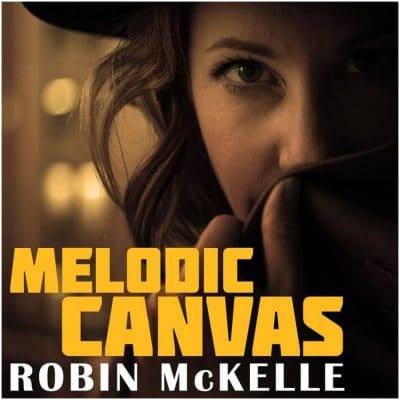Robin McKelle Melodic Canvas
Robin McKelle
Melodic Canvas
Doxie
Robin McKelle debuted as a big band jazz singer twelve years ago and has since tried blues, pop rock and smatterings of soul and gospel. Melodic Canvas marks her return to jazz, this time in a small ensemble. This is McKelle’s album – she wrote six of the ten tunes, did most of the arrangements, and produced the project. Apart from the rich, textured music, McKelle takes on some social commentary, writes intimate lyrics, and without being too overt, spurs us to a considerate call to action.
McKelle sought a more earthy ‘acoustic’ vibe for this outing, with a focus on percussion to allow her vocal subtleties, which range from gritty to supple to classy sophistication, to shine through. She’s treading the line between strength and grace as she mixes stories and character portraits with her social outlook. That’s the short version. She elaborates, “There is a common thread that weaves through the music of this album. To inspire, through music, kindness and acceptance and a willingness to have the courage to stand with our brothers and sisters in equality no matter color, race, religion or ethnicity. To foster hope at a time when we seem to need it most. A musical mentor once told me that as an artist, this is our call to action. Melodic Canvas is my contribution.”
She draws her characters vividly. “Lyla” is about a struggling teen while “Simple Man” tells the tale of an immigrant in these times of Trump. Her two original social commentary tunes are the opening single, “Do You Believe,” where she questions religion, hate, and misogyny. She takes a similar stance on “It Won’t End Up” and covers Allen Toussaint’s “Yes We Can Can” to urge us forward.
There’s a balance to the lyrical material found in both the positive “(“Come to Me”) and negative (“You’re No Good”) aspects of romance. She does two from French composers Pierre Delanoe and Hubert Giraud – “The Sun Died” (Ray Charles version) and “Il est mort le soleil” (the bonus track sung in French). She also covers the traditional “Swing Low Sweet Chariot.”
Saxophonist Chris Potter splashes her canvas with his soprano on “Come to Me” and tenor on “Yes, We Can Can.” McKelle had just come of a tour with Danilo Perez’s top notch band when she began writing for the album. She says, “They themselves are great artists so that is what add to the sound of the music. Shedrick Mitchell (piano, organ, Rhodes) was able to grasp the concept of where I was going with the music and he helped shaped the vibe of the music by the way he played what I wrote. I also found that I was missing singing more Jazz. Melodic Canvas is like coming back to jazz a bit. I’m a songwriter, singing jazz soul songs. I love that I’m able to use different timbres in the songs depending on what it calls for. It’s intimate and I love the idea that if you close your eyes, maybe you can visualize us playing the music in your living room. It’s not trying to be anything it’s not.”
This is not the straight ahead jazz that you’ll hear from Diana Krall, Lyn Stanley or other great American Songbook singers. It’s a bit off center as her term “jazz soul” (not to be confused with soul jazz) indicates. No matter what, she has some strong songs here and the musicianship is superb.
Personnel for the Date (aside from Mitchell and Potter)
Vicente Archer – Acoustic and Electric Bass
Daniel Sadownick – Percussion
Al Street – Acoustic Guitar (“It Won’t End Up,” “You’re No Good”)
Marvin Sewell – Acoustic Guitar (“Simple Man,” “The Sun Died”) Electric Guitar (“Simple Man,” ‘You’re No Good”)
The Piano Man’s Choir – 5 vocalists on “Swing Low Sweet Chariot” and “Yes We Can Can”
- Jim Hynes
[amazon_link asins=’B07BF46TZ2,B000EWKLIA,B00RO5LRV0,B01MZ0URU6,B001BJ6652,B00DBJ59JE,B003BZXI5K,B00S7ET47Q’ template=’ProductCarousel’ store=’maasc-20′ marketplace=’US’ link_id=’feaf8456-5c4e-11e8-aebe-d1d4f8314cc3′]
Discover more from Making A Scene!
Subscribe to get the latest posts sent to your email.














































